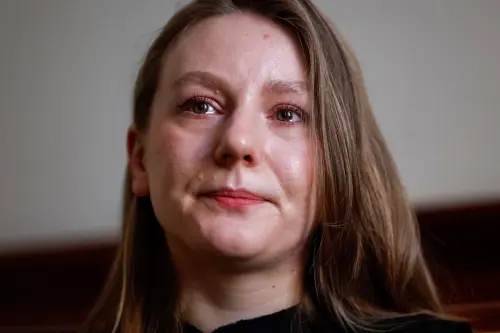When Mariia Pankova last exchanged messages with her close friend Pavlo in December, she was unaware that he was among the Ukrainian troops fighting in Russia's Kursk region. She learned of his situation days later from a fellow soldier, who informed her that Pavlo Humeniuk, 24, a combat engineer in Ukraine's 47th Magura Brigade, had gone missing near the village of Novoivanivka on December 6.
Nearly four months have passed without any news about Pavlo's fate. Pankova continues to search through Telegram and Facebook, hoping to find out whether he is alive or dead. She believes the cost of Ukraine's risky incursion into Russia may have been too steep, a sentiment echoed by many Ukrainians, especially after troop withdrawals from most of Kursk this month following intense fighting.
"I'm just not sure it was worth it," she said, tears streaming down her face as she spoke about her missing friend, with whom she shared a love for hiking in Ukraine's mountains. "We're not invaders. We just need our territories back; we do not need the Russian ones."
In response to inquiries regarding the military operations, Ukraine's armed forces General Staff stated that the offensive aimed to pressure Moscow, divert Russian forces from other fronts, and prevent attacks on neighboring Ukrainian areas. The operation was reported to have achieved most of its goals.
Kyiv's assault on Kursk in August surprised both Russia and the world, marking the largest attack on Russian territory since the Nazi invasion of 1941. Ukrainian soldiers quickly seized approximately 1,376 square kilometers (531 square miles) of Russian territory, but within weeks, the area under Ukrainian control diminished significantly due to troop shortages.
"From the very beginning, logistics was seriously complicated," said Serhiy Rakhmanin, a Ukrainian lawmaker. "We ensured sufficient depth but did not secure enough width." Russia held a manpower advantage along the Kursk frontline, and the situation worsened late last year when elite units and advanced drone forces were deployed, bolstered by North Korean troops. They intensified their assaults, moving closer to Ukrainian supply routes.
"They not only increased their numbers opposing our military but also improved its quality," Rakhmanin noted, as Russian President Vladimir Putin has not acknowledged North Korean involvement.
Russia's reclaiming of the Kursk region removed a potential bargaining chip for Ukraine amid ongoing negotiations to end the conflict. Ukraine's retreat from the city of Sudzha, confirmed on March 16, fueled public debate on the incursion's merits.
Soldier Oleksii Deshevyi, 32, a former supermarket security guard who lost his hand in September fighting in Kursk, expressed doubt about the operation's rationale. "We should not have started this operation at all," he remarked from a rehabilitation center in Kyiv.
Ukrainian President Volodymyr Zelenskiy recognized the challenging situation for his military in Kursk and anticipated continued Russian attacks aimed at dislodging Ukrainian forces. However, he denied claims by Putin and Trump suggesting that Ukrainian troops were encircled.
Reports indicated that Russian forces were deploying small assault groups to breach the Ukrainian border in the Sumy region and may be preparing for a larger attack.
Russia's chief of General Staff, Valery Gerasimov, recently confirmed incursions in Sumy and reported significant Ukrainian losses in Kursk. Despite Ukraine transitioning to a defensive operation, its goals included maintaining territorial control, exhausting the enemy, and inflicting personnel losses. The General Staff claimed nearly 1,000 Russian soldiers were captured, with some exchanged for Ukrainian prisoners.
Due to the operation, Moscow was reported to have formed three new military groupings, totaling about 90,000 soldiers, along with 12,000 North Korean troops. Independent verification of these assertions has not been possible.
Critics have labeled the operation a risky gamble since its inception. Viktor Muzhenko, former head of Ukraine's General Staff, suggested that Ukraine should focus on defending its key territories instead of engaging in unpredictable operations.
However, some viewed the operation as a significant setback for Russia. Oleksander Syrskyi, Ukraine's commander-in-chief, remarked that it had diverted and inflicted casualties on some of Russia's best troops. Rakhmanin added that it bolstered morale in Ukraine after previous territorial setbacks.
As negotiations between Trump and Putin for a peace deal unfold, Pankova reflects on her friend Pavlo and doubts whether any agreement could truly prevent further territorial encroachments by Russia. She is contemplating joining the armed forces, saying, "Every time someone tries to sell a piece of Ukraine, they must remember the sacrifices we have already made and the many lives lost for that."
